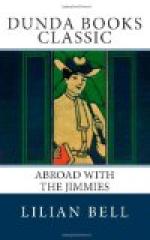There is no use in denying the truth. Tolstoy is always the teacher and the author. I could not imagine him the husband and the father. He seemed in the act of getting copy, and had a way of asking a question, and then scrutinising both the question and the answer as one who had set a mechanical toy in motion by winding it up. Tolstoy would make an excellent reporter for an American newspaper. He could obtain an interview with the most reticent politician. But I had a feeling that his methods were as the methods of Goethe.
His wife evidently does not share his own opinion of himself. She listened with obvious impatience to the conversation, then she drew Bee and Mrs. Jimmie aside, and they were soon in the midst of an animated discussion of the Rue de la Paix.
Tolstoy overheard snatches of their talk without a sign of disapproval. I have seen a big Newfoundland watch the graceful antics of a kitten with the same air of indifference with which Tolstoy regarded his wife’s humanity and naturalness. Tolstoy takes himself with profound seriousness, but, in spite of his influence on Russia and the outside world, the great teacher has been unable to cure his wife’s interest in millinery.
Nordau told me in Paris that Tolstoy was a combination of genius and insanity. Undoubtedly Tolstoy is actuated by a genuine desire to free Russia, but the idea was unmistakably imbedded in my mind that his Christianity was like Napoleon’s description of a Russian. Scratch it and you would find Tartar fanaticism under it,—the fanaticism of the ascetic who would drive his own flesh and blood into the flames to save the soul of his domestics. This impression grew as I watched the attitude of the countess toward her husband. What must a wife think of such a husband’s views of marriage when she is the mother of thirteen of his children? What must she think of insincerity when he refuses to copyright his books because he thinks it wrong to take money for teaching, yet permits her to copyright them and draw the royalties for the support of the family?
Her opinion of her famous husband lies beneath her manner, covered lightly by a charming and graceful impatience,—the impatience of a spoiled child.
When we got into the carriage I said:
“Well?”
“Well,” said our friend the consul, who had not spoken during the interview, “he is the queerest man I ever met. But how he pumped you!”
“We are all ‘copy’ to him,” said Jimmie. “He wanted information at first hand.”
“Sometime he may succeed in convincing his daughter,” said Mrs. Jimmie, “but never his wife. She knows him too well.”
“Yet he seemed interested in you and Jimmie,” said Bee, ruefully. Then more cheerfully, “but we’re asked to come again!”
“We are living documents; that’s why.”
“What do you think of him?” said Jimmie to me with a grin of comradeship.




